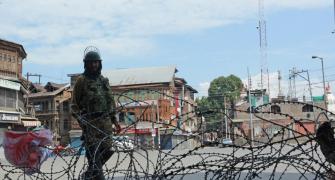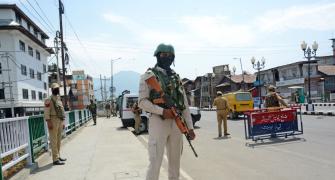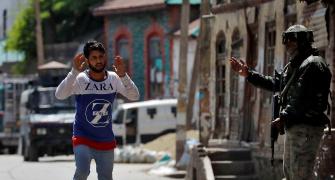'Sinha's skills at resolving contradictions will be required to smoothen the functioning of the bureaucracy which has been so fractious that it tripped up even a seasoned bureaucrat like his immediate predecessor, G C Murmu,' notes avid Devadas.

In choosing a new lieutenant governor for Jammu and Kashmir, Prime Minister Narendra Modi appears to have prioritised the ability to connect with the grassroots and to reach out across ethnic, religious, and ideological divides in the Union territory.
Manoj Sinha, who has been entrusted with the challenging task, will have to be innovative to employ his grassroots connect, for security threats in Kashmir could bog down his efforts to reach out.
However, those who have known him for decades say that he reaches out not only to those who share his ideological positions but to others as well.
A highly-placed official who knew Sinha as a senior at Benaras Hindu University points out that Sinha used to treat the elder Communist Party of India leader Sarjoo Pandey from his native Ghazipur as a role model, particularly for his work among the poor, even though Pandey's politics was very different from Sinha's affiliations. Sinha continued to speak highly of Pandey even as recently as during the 2019 election campaign.
His junior at the university says that although Sinha was a leading light of the Jana Bharatiya Janata Party-affiliated Akhil Bhartiya Vidyarthi Parishad, he had friends even in the Left-oriented All India Students Association and the Congress.
No doubt this openness to dialogue stood him in good stead when the prime minister sought a replacement for G C Murmu as lieutenant governor.
The Union territory, which has a Muslim majority, is extremely diverse in terms of ethnicity, religion, and regional affiliations. Its mountainous terrain has created several small niches which have remained largely isolated from each other for centuries.
The need for inclusion is one of the key reasons Modi retained N N Vohra as governor of the erstwhile state for four years of his first term, and chose to replace Vohra with Satya Pal Malik, who was sent almost two years ago and remained the governor until the state was reduced to a Union territory with a lieutenant governor.
Malik had once revealed that one reason the prime minister preferred him to run J&K was that he had worked with a range of political parties, and had been a party colleague of former chief minister Mufti Mohammed Sayeed in the Janata Dal. Malik had at various times been in five other parties, including the Congress, before he joined the BJP.
Manoj Sinha is known as a quiet doer who manages work efficiently so that deadlines and standards are met. He was regarded as one of the most efficient performers in the council of ministers when he was the minister of state for railways from 2014 and minister of state with independent charge of communications from 2016.
Sinha's reputation for honesty must also have been a factor in his selection for the new job. He will be tested on that score, for he must clean up a compromised administration. Corruption is said to have scaled new heights (external link) in the Union territory.
The well-placed official reveals that Modi has particular regard for Sinha's background in science. The prime minister is reported to have told colleagues not to go by Sinha's preference for the dhoti, and realise that he is an engineer.
Indeed, Sinha was known as a topper when he joined the IIT at BHU where he was elected its president of the students union at the age of 23.
He earned his BTech and MTech degrees at the institution and was well-respected as a fine student with outstanding leadership qualities.
Sinha's skills at resolving contradictions will be required to smoothen the functioning of the bureaucracy which has been so fractious that it tripped up even a seasoned bureaucrat like his immediate predecessor, Murmu.
Malik stated a few weeks before he was transferred out to Goa that the prime minister had told him he wanted the state to shine, so that it was the envy of those across the Line of Control. Tragically, the ego tussles within the bureaucracy over the past couple of years have prevented that.
Lobbies loyal to certain top bureaucrats, to ministers at the Centre, and to certain regional and caste cliques have a tendency in some places to vitiate the cohesive functioning of an administration.
Being a politician, Sinha will no doubt be better able to resolve any such issues and ensure that the bureaucracy works as a team and delivers on the government's priorities.









